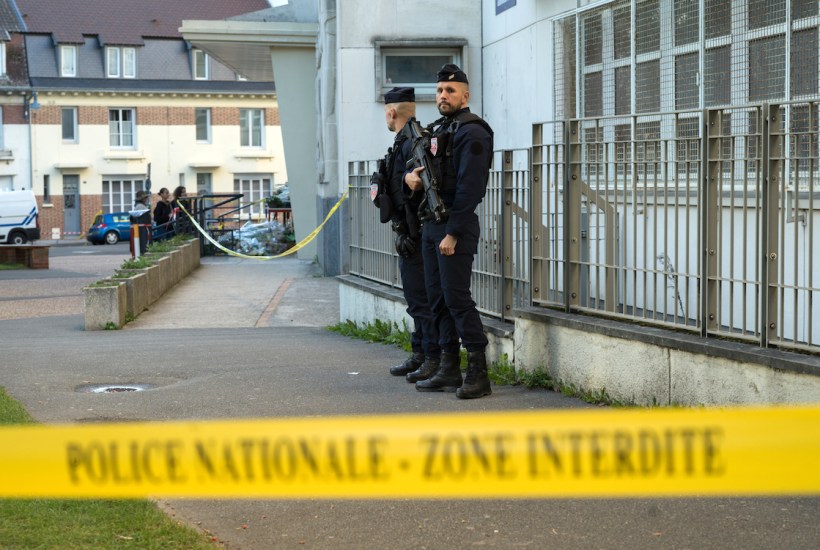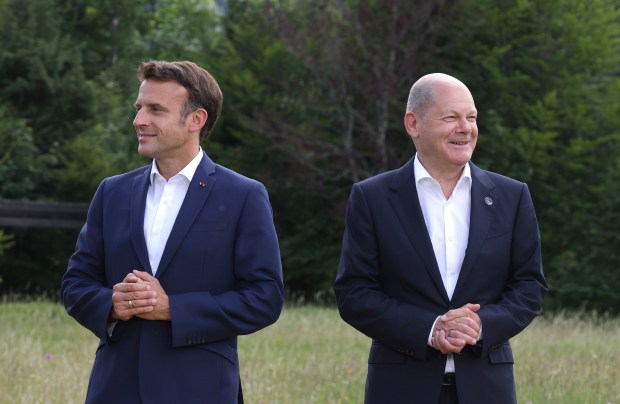Rarely has the publication of a book been so providential. The Teachers Are Scared was released in France last Wednesday, written by Jean-Pierre Obin, a former teacher who rose to become the General Inspector of France’s National Education.
Two days later, Dominique Bernard was stabbed to death in his school in Arras. The man arrested on suspicion of his murder is a young Islamist of Chechen origin, the same profile as the extremist who killed Samuel Paty in 2020.
Two dead in three years, and France’s teachers live in fear that there will be more
Two teachers murdered in three years. No wonder, as Obin states, ‘80 per cent of teachers are scared’.
Iannis Roder, a teacher and also a member of France’s National Education Laïcité council, gave a stark assessment of the implication of Friday’s attack. ‘All teachers are now potential targets,’ he explained. ‘Samuel Paty was killed because he had shown cartoons [of Muhammad]. Dominique Bernard was killed because he was a teacher and because he was there… there is nothing but hatred for who we are and what we do.’
Prime Minister Elisabeth Borne told the teaching profession over the weekend that they have the government’s unwavering support. ‘We will not give in to violence, we will confront it and we will fight it,’ she declared. That’s easy for a political leader to say, flanked by their armed bodyguards, never exposed to the tension that pervades many French schools.
According to a report in France last year, 56 per cent of teachers self-censor in the classroom in order to avoid ‘any incidents triggered in the name of religious or philosophical convictions’. This is a 20 per cent increase on a similar survey in 2018.
For six years my wife has been a teacher in a state school in Seine-Saint-Denis, north of Paris, the department with the highest rate of impoverishment and immigration in mainland France. When I asked her if she self-censored she thought for a few moments and said she was cautious at times about what she said. So, yes, probably, on occasion.
I also asked if she felt fear in her job. No, but she came to teaching after a corporate career. She has more confidence and life skills than her younger peers not long out of university. She believes that these teachers in particular require greater guidance from the government, an instruction kit in how to defend republican values, as well as swift and unconditional support if they are threatened in the classroom.
My wife’s subject is French literature, not history, which was Samuel Paty’s area of expertise. According to some reports, the man who carried out Friday’s attack was specifically hunting for history teachers.
Nonetheless, sometimes in the classroom my wife will touch on religion and politics and that is when she is cautious about what she says. Most of her pupils are very committed to their religion and are increasingly ready to challenge French laïcité.
A survey in 2021 disclosed that 65 per cent of Muslim pupils in secondary schools feel greater allegiance to Islam than they do to the Republic. My wife experienced this insurrection just last week when six girls refused to appear in the class photo because they weren’t allowed to wear a headscarf.
This shift in loyalty has accelerated in the three years since the Black Lives Matter movement swept the west, according to my wife. There is, she tells me, a growing ‘anti-Whiteness’ among her pupils, which has also been noted with alarm by her Muslim colleagues in the staff room.
This hostility is not directed at my wife personally – she has a strong bond with the majority of her pupils who are well-behaved and respectful in the classroom. But she hears how they talk to each other about the white French – ‘babtou’ as they are known, a derivative of a pejorative West African word for ‘whites’.
This animosity is fuelled by social media but also by the words and action of some on the French left. My wife was once of this political creed, but no more. She feels that the political and cultural left has abandoned its republican ideals this century, a view articulated in a recent Le Figaro op-ed by a former teacher who, like my wife, worked in one of France’s most volatile regions. ‘This universalist ideal, which enables everyone to rise above their origins and any form of social or cultural distinction as citizens, has been replaced by the Anglo-Saxon multiculturalist model,’ he wrote.
By importing identity politics into France from America, the left has enabled the rise of Islamism by encouraging a sense of victimisation and oppression among the country’s six million Muslims.
Schools across France will today observe a minute’s silence, not just to remember Dominique Bernard but also to honour the memory of Samuel Paty, murdered on this very day in 2020. His sister, Mickaëlle, is campaigning to have a full inquiry into her brother’s death, convinced that the full story of how he was abandoned by the state has not been disclosed.
Earlier this year, Mickaëlle wrote a letter to the Senate demanding that action be taken to protect teachers from Islamic extremism. ‘The stakes are firmly before us, and it’s our duty to stop leaving our teachers alone to take “a risk”, as they say, in defending our republican values,’ she wrote. ‘It’s time to show unity, fraternity and courage, to show something other than our fear in demanding protection.’
The moment I learned of Friday’s tragedy I phoned my wife. She hadn’t heard the news. There was a sharp intake of breath on the other end of the line and then her first words: ‘Not again’.
Two dead in three years, and France’s teachers live in fear that there will be more. The frontline of the Republic’s war with Islamic extremism is now in the classroom.
Got something to add? Join the discussion and comment below.
Get 10 issues for just $10
Subscribe to The Spectator Australia today for the next 10 magazine issues, plus full online access, for just $10.





















Comments
Don't miss out
Join the conversation with other Spectator Australia readers. Subscribe to leave a comment.
SUBSCRIBEAlready a subscriber? Log in